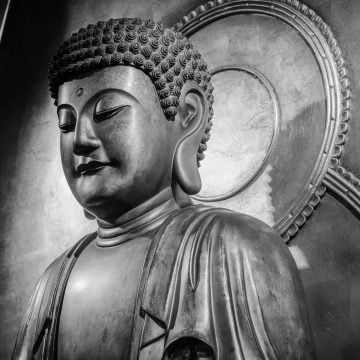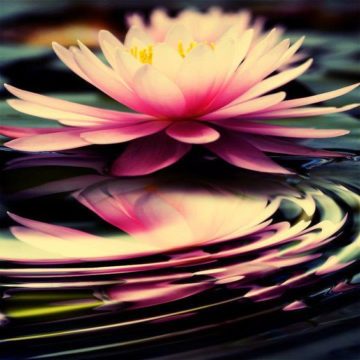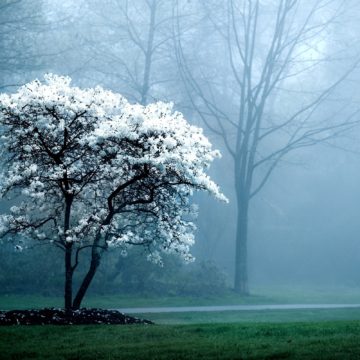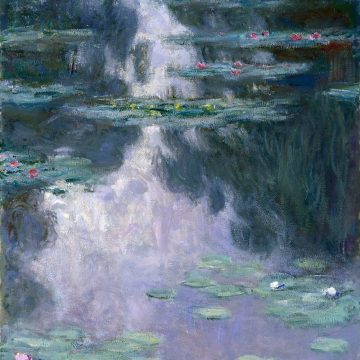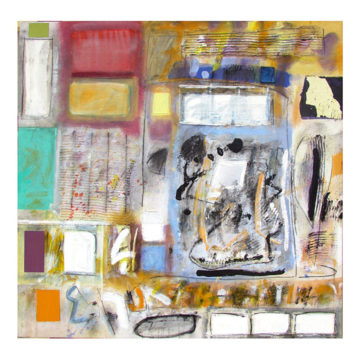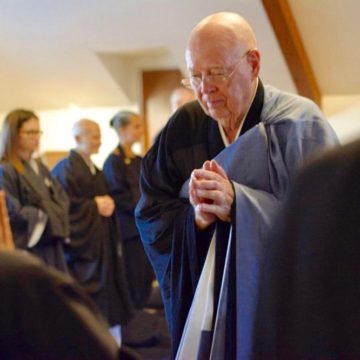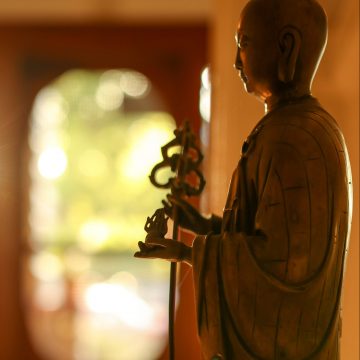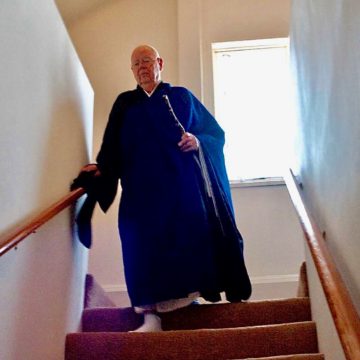In a talk that begins with a famous koan about a flag waving in the breeze, Nyogen Roshi encourages us to move beyond the limitations of the chattering mind that we mistake for our true self. Discovering who we really are sounds daunting, but Roshi helps us keep things in perspective…
Clarifying Koan Practice
Let’s clear up the misconceptions about what it means to study koans. A koan is not a puzzle or conundrum. They aren’t to be reasoned with intellectually or used as a form of psychotherapy. A koan is to be experienced. They will aid you in producing a state of consciousness in which you have full awareness, and as you practice longer, that state will generalize into how you function moment after moment in any circumstance…
Ordinary Mind
In one of the most famous Zen stories, Joshu asks his teacher Nansen, “What is the Way?” Nansen replies, ” Ordinary mind is the Way.” What is ordinary mind? Nyogen Roshi walks us into it. “Get quiet,” he says. “Purify the mind–which means stop talking to yourself. Just sit here in the present moment. What else is there to be known? You know everything there is, perfectly.”
The Basic Teaching
In a powerful and wide-ranging talk, Nyogen Roshi touches on quantum physics and the delusion of understanding; how to listen to a talk; the importance of knowing how to die well; and how his last dokusan with Maezumi Roshi, his teacher, illuminates an exchange between Obaku and Rinzai…
This Very Point
Those of us who practice are lucky when we encounter difficult times. Before that, we coast along in a comfort zone, thinking that bad stuff will be taken care of and the good guys will win and everyone is going to live happily ever after…
The Manifest Koan
The manifest koan is you, what is apparent and appearing, depending solely on right now. Nothing else. If you’re still caught in the comparing mind, the judgmental mind, you won’t see it. If you’re trapped in seeing objects as separate from you, you are far from it. But I think everybody here is starting to sense it…
You’re in the Bardo Right Now
In a recent talk on the Bardo–the transition between life and death–Nyogen Roshi highlights an insight from a modern Tibetan master’s commentary on a classic text: Each of us exists in the Bardo right now…
Right View
After a particularly beautiful period of meditation, Nyogen Roshi is prompted to share his inner experience of zazen. Though setting aside striving and expectation can be difficult, the rewards are beyond measure. “You relax and release,” Roshi tells us, “then at a certain point, you begin to feel good, and the sitting itself becomes rich. You experience the wonder of what you truly are.”
The Issue of Suffering
The image of a migrant father and his young daughter lying dead on a bank of the Rio Grande prompts Nyogen Roshi to reflect on Buddhist teachings around suffering. Drawing on his own experiences with suffering as well as lessons handed down in the Zen tradition, Roshi concludes that the story of the Buddha contains the only possible remedy. “Who else other than yourself is sitting there?” Roshi says. “You can only look into your own mind. If you can understand where the pathway is, simply trust the words of the Buddha. His own life was the prescription and the path.”
Vast Emptiness
Karma is real, Nyogen Roshi reminds us. Zen practice is real. What do we see when practice allows us a glimpse of our world as it truly is? The vast emptiness that Bodhidharma spoke about in his exchange with Emperor Wu. What do most of us do when we catch that glimpse? “You turn it into a concept,” Roshi tells us. “What you’re holding onto now is delusion! You have to keep stepping into each new moment. That’s the point to our practice.”
Realizing Dharma
In this passionate summary of his teaching, Nyogen Roshi exhorts us to put aside the intellectual pursuit of Dharma–the true nature of each one of us. Realizing our true nature can only be accomplished through practice. “You truly are the Dharma,” Roshi says. “You truly are the Way. But do you understand what that means? No! You can’t understand that. You can only be that.”
Beating the Drum
Kasan said, “Cultivating study is called learning. Cutting off study is called nearness. Going beyond these two is to be considered real going beyond.” A monk came forward and asked, “What is real going beyond?” Kasan said, “Knowing how to beat the drum…”


